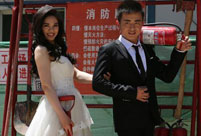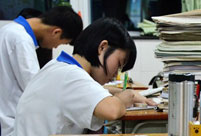 Luoyang aims to become 'Chinese Culture City'
Luoyang aims to become 'Chinese Culture City'
 Century-old jade disc found confirms ancient legend
Century-old jade disc found confirms ancient legend
 A serious mind behind Chinese leader
A serious mind behind Chinese leader
 Panda Cubs to Predict 2014 World Cup Winners
Panda Cubs to Predict 2014 World Cup Winners
 China Southern Airlines flight attendants win titles in service contest
China Southern Airlines flight attendants win titles in service contest
 Pupil's performance art persuades people to stop smoking
Pupil's performance art persuades people to stop smoking
 Nie Chenxi's clay tigers
Nie Chenxi's clay tigers
 Children's Day wishes
Children's Day wishes
 Chinese Kung Fu charms Silicon Valley
Chinese Kung Fu charms Silicon Valley
 Tranquil Yankou ancient town
Tranquil Yankou ancient town
5. Continuously Promoting Exchanges and Cooperation Between the Mainland and Hong Kong
Increasingly frequent exchanges and closer cooperation between Hong Kong and the mainland have expanded channels for common development by leveraging complementary advantages. Hong Kong has gained access to enormous space and momentum for development by taking advantage of the broad market and abundant factor resources of the mainland and opportunities of China's rapid development. By consolidating and enhancing its existing advantages, Hong Kong can better play its role in introducing external investment and talents, in absorbing internationally advanced technologies and managerial expertise, in serving as a bridge for implementing China's "go global" strategy, and in helping quicken the shift of the growth mode on the mainland. In addition, Hong Kong's experience can be of reference for the mainland to pursue innovative ways in social and economic management.
As contacts between the mainland and the HKSAR become closer and mutual understanding between the people deepens, the Hong Kong compatriots are getting a stronger sense of national identity and commitment. They pay closer attention to the development of the country and take an active part in the country's modernization drive as well as public welfare activities, such as poverty alleviation, education and protection of the rights of women and children. When the mainland suffered major natural disasters, the Hong Kong compatriots extended generous and active support for the rescue and relief work and post-disaster reconstruction. These fully demonstrate the strong ties of blood and affection between the people on the mainland and the Hong Kong compatriots.
The central government will continue to support the HKSAR government in forming a closer working relationship with relevant government departments at both the central and local levels, support the Hong Kong compatriots in having more exchanges with people on the mainland, and support Hong Kong in playing its unique role in the country's endeavor of comprehensive reform and opening up. The central government encourages Hong Kong to carry out broader and deeper exchanges and cooperation with the mainland, and make concerted efforts with the mainland to build the common home of the Chinese nation.
Conclusion
The implementation of the principle of "one country, two systems" in the HKSAR has achieved widely recognized success. This fully proves that "one country, two systems" is not only the best solution to the Hong Kong question left over from history but also the best institutional arrangement for the long-term prosperity and stability of Hong Kong after its return to the motherland. Firmly advancing the cause of "one country, two systems" is the common wish of all the Chinese people, the Hong Kong compatriots included, and is in the fundamental interests of the country and people, the general and long-term interests of Hong Kong and the interests of foreign investors.
The endeavor to further the practice of "one country, two systems" requires both a comprehensive and accurate understanding and implementation of the policy to ensure that the practice moves forward on the right track and proactive and effective response to the difficulties and challenges confronting Hong Kong in its development. In the face of profound adjustments and changes in the economic environment both within and outside the region, Hong Kong needs to continuously enhance its competitiveness. Some deep-seated problems that have built up over a long period of time are becoming more conspicuous and need to be solved by pooling the efforts of all sectors. The deepening exchanges and cooperation between the HKSAR and the mainland call for better communication and coordination, and the concerns of the people should be properly addressed. Meanwhile, it is necessary to stay alert to the attempt of outside forces to use Hong Kong to interfere in China's domestic affairs, and prevent and repel the attempt made by a very small number of people who act in collusion with outside forces to interfere with the implementation of "one country, two systems" in Hong Kong. A proper handling of these issues and further implementation of "one country, two systems" in Hong Kong will further demonstrate the strong vitality of the policy of "one country, two systems."
Now, people all over the country are working hard with full confidence towards the "two centenary goals" - to complete the building of a moderately prosperous society in all respects when the Communist Party of China celebrates its centenary in 2021, and to turn China into a modern socialist country that is prosperous, strong, democratic, culturally advanced and harmonious when the PRC marks its centenary in 2049 - as well as the Chinese dream of the great rejuvenation of the Chinese nation. Continuously enriching and developing the practice of "one country, two systems" in the HKSAR and maintaining long-term prosperity and stability in the region are integral part of the Chinese dream. It is also a necessary requirement for improving and developing socialism with Chinese characteristics and promoting the modernization of the national governance system and governing capability. The central government will continue to work with the HKSAR government and the Hong Kong compatriots to fully and faithfully implement the principle of "one country, two systems" and the Basic Law, so as to further the development of all undertakings in Hong Kong. We are convinced that the HKSAR will advance steadily forward under the principle of "one country, two systems" and the Basic Law, and work hand in hand with the mainland toward a better future for the Chinese nation.
Appendix
I. Statistics of Hong Kong's Economic and Social Development
1. The Gross Regional Product (GRP) of Hong Kong rose from HK$1.37 trillion in 1997 to HK$2.12 trillion in 2013, an average annual growth rate of 3.4 percent.
2. The fiscal reserves of the HKSAR government had increased by 65.2 percent from HK$457.5 billion at the end of 1997 to HK$755.7 billion at the end of March 2014.
3. Hong Kong's foreign exchange reserves had grown by 3.35 times from US$92.8 billion at the end of 1997 to US$311.2 billion by the end of 2013.
4. According to the 2013 statistics released by the International Monetary Fund (IMF), Hong Kong's GRP and per-capita GRP respectively ranked 35th and 7th in the world, as calculated by purchasing power parity (PPP).
5. As Hong Kong is a leading international banking center, 73 of the world's top 100 banks operate in Hong Kong.
6. As Asia's second-largest and the world's sixth-largest securities market, Hong Kong recorded a market capitalization of HK$24.04 trillion by the end of 2013. IPO funds raised by the Hong Kong Stock Exchange in 2013 totaled HK$166.5 billion, making Hong Kong the second-largest IPO market in the world.
7. Hong Kong's foreign exchange market scored an average daily turnover of US$274.6 billion in 2013, making it the fifth-largest foreign exchange market in the world.
8. According to the 2012 Financial Development Report released by the World Economic Forum in October 2012, Hong Kong's financial development index ranked top worldwide. Hong Kong ranked third in the Global Financial Centres Index published by the City of London Corporation in September 2013.
9. As the world's ninth-largest trading economy, Hong Kong is home to approximately 100,000 import and export companies, which trade with almost every country and region in the world.
10. Hong Kong's external merchandise trade grew by a factor of 2.48 from HK$3.07 trillion in 1997 to HK$7.62 trillion in 2013.
11. Hong Kong is one of the largest recipients of foreign direct investment (FDI). The World Investment Report 2013 released by the United Nations Conference on Trade and Development (UNCTAD) shows that Hong Kong is the world's third-largest recipient of FDI. By the end of 2013, the total number of overseas companies registered in Hong Kong reached 9,258, an 83 percent increase over 1997. By June 2013, 1,379 foreign-funded companies in Hong Kong served as regional headquarters and 2,456 foreign representative offices served as regional offices, recording 52.7 percent and 52.5 percent increase respectively over that at the end of 1997.
12. As one of the largest container ports in the world, Hong Kong handled 22,288,000 ISO containers in 2013, 52.9 percent higher than in 1997.
13. Hong Kong is the world's fourth-largest ship registry. By the end of 2013, Hong Kong-registered ships numbered 2,327, totaling 86.43 million dwt.
14. The Hong Kong International Airport, from which more than 100 airlines operate flights, is the world's fifth-busiest passenger airport and has the world's most active air cargo operation. Its passenger traffic and cargo throughput in 2013 were 2.18 times and 2.53 times the 1998 figures, respectively.
15. Hong Kong ranked third among over 660 international port cities or regions in the 2013 Global International Shipping Center Index.
16. The HKSAR government's 2014-2015 budget recurrent expenditure on education is HK$67.13 billion, 21.8 percent of the government's total recurrent expenditure. The budget for expenditure on education is HK$75.37 billion, accounting for as high as 18.3 percent of the government's total expenditure budget and ranking first in all budget expenditure items. Hong Kong has been providing 12-year free education through public schools starting from the 2008/09 school year.
17. Since Hong Kong returned to China in 1997, institutions of higher learning that award local degrees have increased from 12 to 17, of which eight are funded by the government. The University of Hong Kong and the Hong Kong University of Science and Technology were among the top 10 in the Asia University Rankings released by Times Higher Education in 2013. The University of Hong Kong was ranked 43rd in the Times Higher Education World University Rankings 2013/14.
18. From the second quarter of 2000 to the third quarter of 2013, the percentage of people with post-secondary education in the entire employed population rose from 23.7 percent to 35.1 percent, and the percentage of those with higher education in the employed population increased from 14.5 percent to 26 percent. Hong Kong students remained high in the 2012 rankings of the Programme for International Student Assessment (PISA). Hong Kong ranked third in the Global Index of Cognitive Skills and Educational Attainment published by education company Pearson in 2012.
19. In the 2014/15 fiscal year, the HKSAR government's budget expenditure on medical and health care reaches HK$52.4 billion, accounting for 17 percent of the government's recurrent expenditure.
20. By the end of 2012, all types of health facilities in Hong Kong had a total of 35,500 beds. Public medical facilities with 90 percent of their funding coming from the government comprise 38 public hospitals, 48 specialist clinics and 73 general out-patient clinics, with 64,000 employees and 27,000 beds. They provide 90 percent of the in-patient services and 30 percent of the out-patient services of Hong Kong.
21. Hong Kong's infant mortality rate, dropping to 1.6 per thousand in 2013 from 4 per thousand in 1997, is one of the lowest in the world. Hong Kong also enjoys one of the highest life expectancies in the world - 80.9 for men and 86.6 for women.
22. By June 2013, Hong Kong had, as a member of a Chinese government delegation or in other appropriate capacities, participated in activities of 41 international inter-governmental organizations limited to states. Among these organizations were the International Monetary Fund, World Bank, International Civil Aviation Organization, Food and Agriculture Organization of the United Nations, and International Criminal Police Organization. Hong Kong joined 37 international inter-governmental organizations not limited to states, including the World Trade Organization, Asia-Pacific Economic Cooperation and World Meteorological Organization. Hong Kong had attended over 1,400 international conferences as a member of Chinese government delegations or in other appropriate capacities and over 20,000 international conferences not limited to states under the name of Hong Kong, China.
23. Each year, the HKSAR hosts an average of over 100 visits by foreign senior government officials and influential personages of academic circles and think tanks from all over the world. Many heads of state and heads of government have paid visits to or attended international conferences in Hong Kong. Hong Kong has hosted or co-hosted over 1,000 international conferences, such as the annual meetings of the World Bank Group and IMF, the Sixth WTO Ministerial Meeting, Telecom World of the International Telecommunication Union, Diplomatic Conference of the International Maritime Organization, Asian Regional Workshop of the World Intellectual Property Organization, and Asian-Pacific Postal Union Executive Council Meeting.
24. The HKSAR has signed visa waiver agreements with 42 countries, and 150 countries and regions have provided visa-free entry or visa upon arrival for HKSAR passport holders.
25. The HKSAR has signed civil air services agreements and civil air services transit agreements with 67 countries, double taxation avoidance agreements with 35 countries and regions, investment promotion and protection agreements with 17 countries, legal assistance in criminal matters agreements with 30 countries, transfer of fugitives agreements with 19 countries, and transfer of sentenced persons agreements with 13 countries.
26. The HKSAR government has established 11 economic and trade offices in Geneva, Brussels, London, Toronto, Tokyo, Singapore, Sydney, Washington D.C., New York, San Francisco and Berlin to promote Hong Kong's economic, trade, investment and public relations with relevant countries and regions.
27. There are 66 foreign consulates-general and 73 honorary consuls in Hong Kong. The European Commission, Bank for International Settlements, IMF, UN High Commissioner for Refugees, International Finance Corporation, and Hague Conference on Private International Law have offices in Hong Kong.
 |  |
 Beijing strips off in summer
Beijing strips off in summer Heat waves hit China
Heat waves hit China Love at the construction site
Love at the construction site Graduation photos bring memories back to life
Graduation photos bring memories back to life Art school students present works in Nanjing
Art school students present works in Nanjing Xinjiang's first high-speed railway goes on trial run
Xinjiang's first high-speed railway goes on trial run 3D Sea-life Themed Art Garage unveiled in Zhengzhou
3D Sea-life Themed Art Garage unveiled in Zhengzhou
 Creative Photos go viral during graduation season
Creative Photos go viral during graduation season Students in last-minute effort for Gaokao
Students in last-minute effort for Gaokao Top 20 hottest women in the world in 2014
Top 20 hottest women in the world in 2014  Dali, an ideal summer vacation destination
Dali, an ideal summer vacation destination Xichan Temple's little monk hit the Internet
Xichan Temple's little monk hit the Internet Monologue of a modern dancer
Monologue of a modern dancer College girl proposes to boyfriend on Weibo
College girl proposes to boyfriend on Weibo Special operation members in counter-terrorism training
Special operation members in counter-terrorism trainingDay|Week|Month